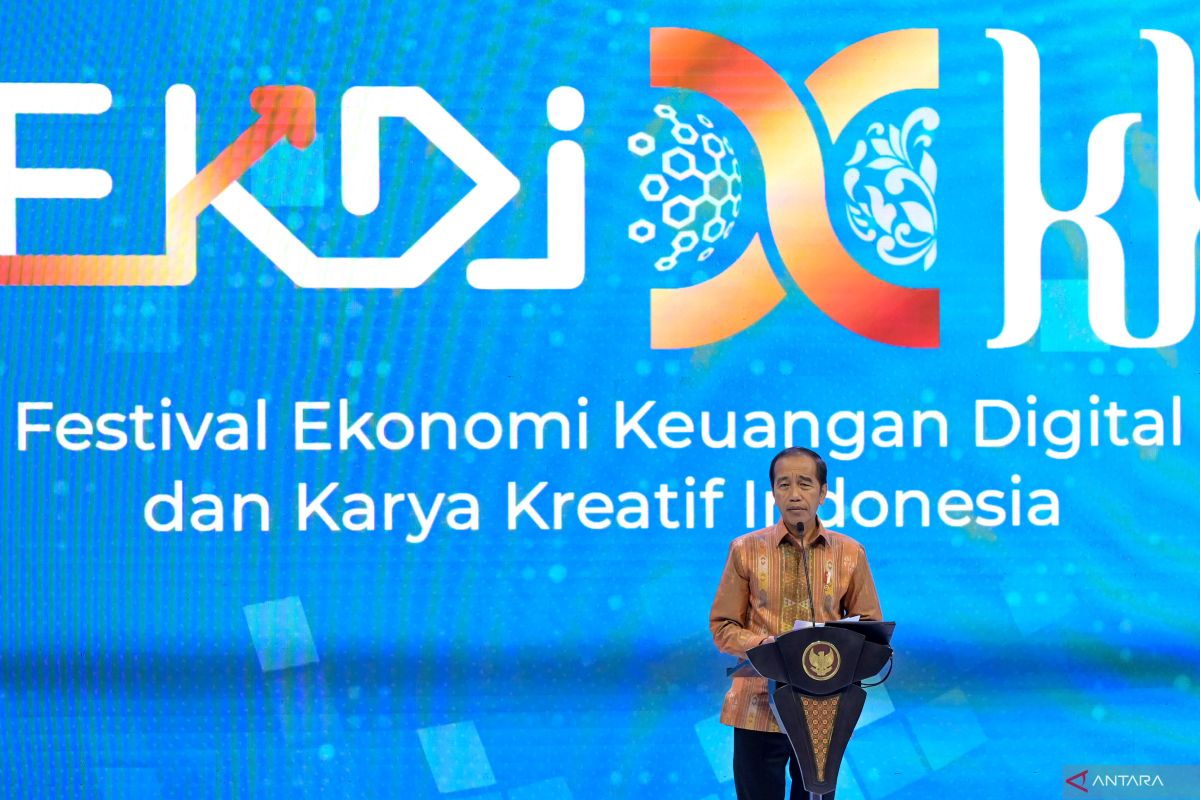When digitalization, technology, and innovation are applied in the economic and financial systems, they will become the engines to expedite inclusive and sustainable economic growth for the community's welfare and the country's progress.
In this context, Bank Indonesia (BI) continues to update, improve, and expand the digitalization of payment systems through the creation of the 2030 Indonesia Payment System Blueprint (BSPI).
After launching the 2019-2025 BSPI, BI also created BSPI for the next five years, from 2025 to 2030, which aims to accelerate the progress of the national digital economy for future generations.
In the last five years, various positive outcomes through the implementation of the 2025 BSPI have been achieved from several initiatives, such as the National Open API Payment Standard (SNAP), Quick Response Code Indonesian Standard (QRIS), BI-FAST payment system, electrification, and regulation reforms.
BI has expanded cross-country QRIS cooperation to eight countries: Malaysia, Thailand, Singapore, the Philippines, Japan, South Korea, the United Arab Emirates, and India.
In the future, BI will continue to expand the coverage of QRIS cooperation with other countries, especially Indonesia's trading partners.
QRIS is payment standardization by utilizing a QR code method that BI implements to make transactions easier, quicker, and more secure.
In the second quarter of 2024, the performance of digital economic and financial transactions was recorded as strong, supported by safe, smooth, and reliable payment systems.
This is reflected in the BI-Real Time Gross Settlement (RTGS) transactions that rose by 13.42 percent year-over-year (yoy) to Rp42,008.08 trillion (around US$2.63 trillion).
Furthermore, in terms of retail transactions, BI-FAST transactions rose by 67.79 percent (yoy) to 785.95 million transactions. Meanwhile, digital banks' transactions grew positively by 34.49 percent (yoy) to 5,363 million transactions.
For QRIS, transactions grew by 226.54 percent (yoy), with 50.50 million users and 32.71 million merchants.
However, despite the positive achievements, there is a need to adequately respond to several challenges.
Three areas should be prioritized to realize the prospect of increasing digital transactions, with the first being resilient and synergistic infrastructure.
The second area of focus is a consolidated industry that can mitigate the risk of shadow banking, while the third crucial aspect is a collaboration between Bank Indonesia and the industry to encourage innovation and acceptance in a balanced manner to strengthen consumers' literacy and protection.
To this end, BI has created the 2030 BSPI to respond to the dynamics. The blueprint aims to realize resilient payment systems in Indonesia.
The 2030 BSPI is the continuation of the 2025 BSPI, which is created to realize end-to-end integration of digital economy and finance.
President Joko Widodo (Jokowi) highlighted that Indonesia's digital economy will grow fourfold to reach US$210-360 billion in 2030, while digital payments will increase 2.5 times to US$760 billion.
Furthermore, the peak of the demographic dividend is expected to occur in 2030, with 68 percent of the population being people of working age.
To this end, Indonesia must be able to utilize all instruments and optimize all of the potential to continue to grow, including digital transformation in the economy and finance.
Digital transformation should continue to be strengthened to accelerate growth in various sectors of the economy, including micro, small, and medium enterprises (MSMEs).
Digitalization in the production, marketing, and payment processes will drive the progress of MSMEs at the domestic and global levels. In this case, digital transformation must be carried out inclusively and fairly so that everyone has equal access and opportunities that are also supported by consumer protection.
Payment digitalization
BI viewed that payment digitalization will develop faster in the future due to three factors: the bigger participation of millennials, Generation Z, and Generation Alpha, who are more digitally savvy, and the strengthening cross-border payment connectivity.
The flow of digital payment transactions is projected to increase rapidly in the future, in line with international commitments to improve the efficiency of cross-border payment services.
According to BI Governor Perry Warjiyo, the challenge can be addressed by building resilient national payment systems.
With five visions of the 2030 Indonesian Payment System (SPI) translated into five main initiatives as a foundation, the 2030 BSPI seeks to build a resilient and consolidated national payment system, which is a necessary condition for the creation of end-to-end national digital economic-financial integration.
The five visions in the 2030 BSPI are: first, the 2030 SPI supports national digital economic-financial integration to ensure the function of the central bank in the process of money circulation, monetary policy, and financial system stability, as well as encouraging financial inclusion.
Second, the 2030 SPI supports the digitalization of banks as the main institutions in digital finance and economy through open banking and the utilization of digital technology and data in financial businesses.
Third, the 2030 SPI ensures interlinks between fintech companies and banks to avoid the risks of shadow banking through digital technology configuration (such as API), business cooperation, and company ownership.
Fourth, it ensures a balance between innovation and consumer protection, integrity and stability, as well as healthy business competition through the implementation of Know Your Customer (KYC) & Anti-Money Laundering/Combating the Financing of Terrorism (AML/CFT)
Fifth, the 2030 SPI guarantees national interests in digital finance and economy between countries through the obligation to process all domestic transactions domestically and cooperation between foreign and domestic providers, taking into account the principle of reciprocity.
The 2030 SPI visions will be achieved through five 4I-RD (infrastructure, industry, innovation, international, and digital rupiah) initiatives, including the infrastructure initiative oriented towards preparing a resilient and integrated digital economic and financial infrastructure.
The preparation of the infrastructure is carried out by strengthening the stability, scalability, and synergy of the retail payment system infrastructure, developing the BI Payment Clear system to strengthen risk management and meet transaction integrity, developing the Generation III BI-RTGS system, and developing data infrastructure through the development of Payment ID, data capturing systems and BI-Payment Info.
The industry initiative is directed toward structural consolidation through the arrangement of access and entry policies according to the risk profile of the actors, strengthening risk management, and regulatory reform. Structural consolidation is needed to strengthen the industry's risk control capacity while also bolstering competitiveness.
Furthermore, the innovation initiative is oriented toward efforts to ensure a balance between innovation and consumers' protection, integrity, and stability, as well as healthy and collaborative business competition.
These goals will be achieved through three policies: encouraging innovation in payment services, including the establishment of the Bank Indonesia Digital Innovation Center (BI-DIC); boosting digital literacy and adoption in the community; and strengthening aspects of consumer protection.
The international initiative is directed toward expanding payment connectivity between countries by maintaining national interests through the expansion of cross-border QRIS cooperation and interconnection of retail and wholesale payment systems.
The digital rupiah initiative is oriented toward the strengthening of capabilities through digital securities experimentation for various financial market use cases.
In general, the 2030 BSPI will bring a better and more equitable future for the next generations of Indonesia. Smooth payment systems and well-functioning monetary and financial system stability will be the basis for sustainable economic growth.
Moreover, the 2030 BSPI will encourage major efforts for Indonesia's structural economic reform toward digital transformation that integrates the participation of all economic actors, whether large-scale or small-scale, at the central and regional levels in an inclusive digital economic and financial ecosystem.
Hence, digital transformation in the national digital economy and finance can progress faster, surpassing the progress in the last five years, to have a major contribution to Indonesia's economic progress in the future.
Related news: BI supports digital financial industry development with policies
Related news: Kominfo's additional budget required for digitization programs: Budi
Related news: Ministers agree to push digitization to ease tax payments
Translator: Martha Herlinawati, Raka Adji
Editor: Azis Kurmala
Copyright © ANTARA 2024












